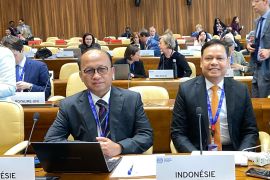This is only about 45 percent of the target, in which one percent of economic growth is expected to absorb 400 thousand workers. Therefore, the unemployment rate early this year dropped only marginally.
The unemployment rate dropped marginally to 5.7 percent or 7.15 million people in February 2014, from 5.82 percent or 7.2 million people in February 2013, according to the Central Bureau of Statistics (BPS).
"Of course, we are not satisfied with this slight drop. We failed to achieve the target in creating jobs because Indonesias economy was weakened as a result of the global economic crisis," Manpower and Transmigration Minister Muhaimin Iskandar said on Monday.
This raises concerns amid the upward trend in the population growth. It is feared that it will lead to an unemployment disaster. Currently, the total number of Indonesian workers has risen to 125.3 million, or an additional 1.7 million from that in 2013 when it was 123.64 million.
Therefore, according to the Kadin Chairman, Suryo Bambang Sulisto, the manpower issue is the most crucial problem that Indonesia is currently facing. Indonesia should achieve a breakthrough to overcome it.
He pointed out that based on the Capital Investment Coordinating Board (BKPM) data, the realization of investment in the first quarter of 2014 amounted to Rp106.6 trillion but it was only able to generate jobs for 260,156 workers.
This decline was in comparison with that in the first quarter of 2013, when the investment only totaled Rp93 trillion yet was able to absorb 361,924 workers.
Manpower Minister Muhaimin stated that the economic growth created so far cannot significantly absorb more new workers. Each one percent in economic growth should be able to provide jobs for some 500 thousand new workers.
Muhaimin noted that efforts to reduce unemployment should be done through developing improved working conditions, which then increases the productivity of workers.
"Good industrial work relations will increase productivity, boost performance, raise companies profits and create new jobs," the minister noted.
The manpower minister, therefore, asked universities to serve as educational and at the same time training institutions to produce ready-for-market workers.
"Universities are not expected to only award certificates to their students, which will only increase the number of unemployed intellectuals," the minister said.
He stated that universities must be able to produce quality graduates, who were ready to enter the job market.
He remarked that other steps that should be taken include efforts to increase workers skills and competence, based on the needs of employers.
Would-be workers with inadequate skills and competence will face difficulties in winning opportunities offered in the job market and by industries, the minister added.
"So far, training and educational institutions, particularly in the private sector, have not been able to provide a curriculum which is suitable with what the market needs," Muhaimin pointed out.
This caused many opportunities to not be filled, as a result of the absence of a link between academia and the job market as well as a matching of skills with jobs, the minister explained.
Moreover, the investment capacity in absorbing workers also declined as reflected in the investment in the first quarter of 2013 that was Rp93 trillion but was able to provide jobs for 361,924 workers, while in the same period of 2014 the investment was Rp106.6 trillion but it absorbed only 260,156 job-seekers.
"This is an indication that investments had shifted from the labor-intensive to capital-intensive businesses. If this trend continues, the projection that is designed to absorb 400 thousand workers for each one percent of economic growth will not be achieved," the Indonesian Chamber of Commerce and Industry (Kadin) Suryo Bambang Sulisto noted.
Therefore, industrial development should be aimed at reducing the unemployment rate.
Deputy Minister for National Development Planning Lukita Dinarsyah claimed that the industrial sector was able to reduce unemployment as it can absorb more workers.
"Modern industrial sector and services are usually the biggest contributors to the creation of job opportunities," Lukita said on Monday. He said the government will encourage the development of the primary sector, such as mineral production.
Measures should be taken in an effort to increase the absorption of job-seekers for each percentage of the economic growth. "In the past, it (each percentage of growth) was able to absorb some 300 thousand to 400 thousand. Now it can only provide jobs for about 200 thousand to 250 thousand workers," Lukita argued.
The government will also boost the development of downstream industries so that they can absorb more workers. It is also doing its best to reinforce the countrys economic structure through downstream industrial development programs and the master plan for the acceleration and expansion of the countrys economic development.
"The government is also developing special economic corridors, which will help boost the development of the industrial sector," Lukita added. The special economic corridors will soon operate so that they would create more jobs.
The Central Bureau of Statistics (BPS) Suryamin said the structure of the work field did not change from that of last year, when the agriculture, trade, service and industrial sectors were still the largest contributors to job creation.
He said compared with the employed people in February 2013, newly absorbed workers in the service sector rose to 640 thousand or about 3.59 percent, in the trade sector it increased to 450 thousand or 1.77 percent and in industry it climbed to 390 thousand or 2.6 percent.
Of the sectors, only the agricultural sector experienced a decline namely 280 thousand or about 0.8 percent, due to the delay in the harvest season, Suryamin said. (*)
(T.A014/INE/S012)
Reporter: Andi Abdussalam
Editor: Fardah Assegaf
Copyright © ANTARA 2014











